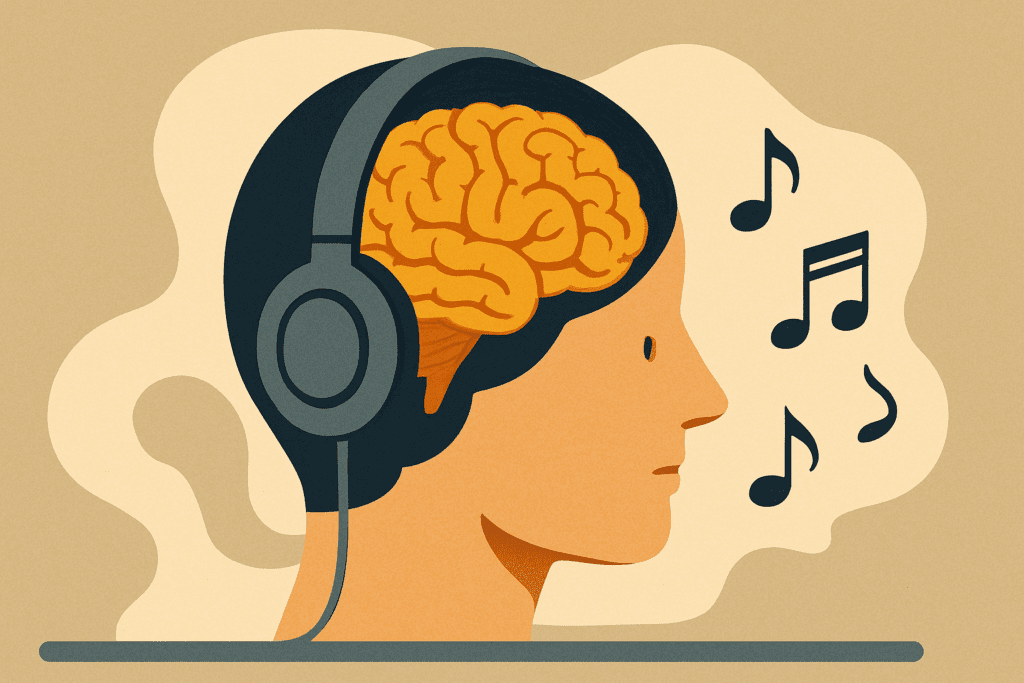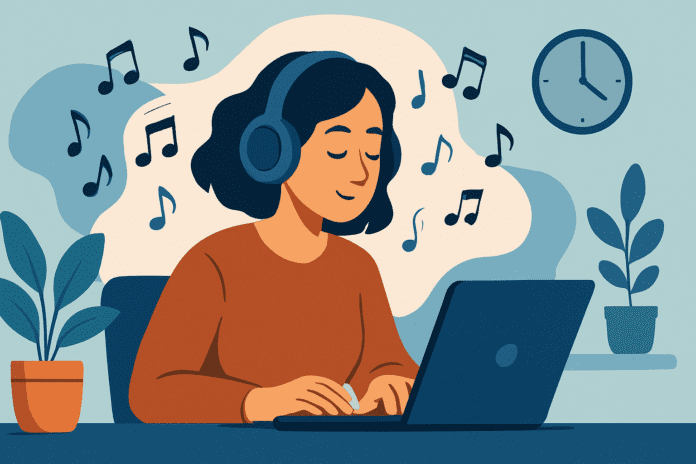In the modern work environment, distractions abound—from the ping of notifications to the hum of open office chatter. Many professionals seek effective strategies to enhance concentration, boost productivity, and preserve mental sharpness over time. One increasingly popular solution is the use of background music for work. When chosen and applied thoughtfully, music can serve as more than a pleasant auditory backdrop; it becomes a powerful tool for cognitive enhancement and brain health support. This article explores the science behind how focus music background music for concentration works, why it benefits the brain, and how to use it effectively for both immediate performance and long-term cognitive well-being.
You may also like: How to Improve Focus at Work Naturally: Science-Backed Techniques to Boost Mental Clarity and Long-Term Brain Health
The Neuroscience of Music and the Brain
Music, while universally appreciated, is processed in complex and fascinating ways by the human brain. Unlike many stimuli, music engages multiple neural networks simultaneously. Listening to music activates the auditory cortex, but it also lights up areas responsible for attention, memory, emotion, and even motor control. This cross-brain stimulation is one of the key reasons why background music for work can improve cognitive function. Neuroscience research has shown that music can help regulate the brain’s default mode network (DMN), which is active during mind-wandering and daydreaming. When individuals need to concentrate on a task, DMN activity should be suppressed. Background music may help facilitate this shift by encouraging a state of flow—a psychological condition where attention is fully absorbed in the present activity.
One particularly notable phenomenon is the “Mozart effect,” originally suggesting that listening to Mozart’s compositions could enhance spatial-temporal reasoning. While later studies have nuanced these findings, the general concept remains influential: certain types of music can prime the brain for focused activity. Classical compositions, ambient electronica, and lo-fi beats have all shown potential for encouraging task-oriented mental states. These effects are especially prominent when music is instrumental, as lyrics can divert attention by engaging language-processing centers. The underlying takeaway is that music is not a passive experience; it actively modulates brain activity in ways that can be optimized for focus and productivity.
Cognitive Benefits of Background Music for Work
Engaging with music while working does more than merely drown out external noise—it can actively elevate cognitive performance. Focus music background music for concentration often includes characteristics such as consistent rhythms, moderate tempo, and minimal dynamic shifts, all of which promote sustained attention. These musical features help the brain enter a more alert yet calm state, reducing the mental fatigue that frequently accompanies extended periods of deep work. Multiple studies have shown that students and professionals who listen to background music while completing tasks often exhibits higher accuracy, improved memory retention, and faster task completion times.
Beyond immediate productivity, music may also enhance cognitive flexibility. This refers to the brain’s ability to switch between tasks, manage competing demands, and adapt to new information—all essential for success in dynamic work environments. Background music that maintains a stable, predictable auditory environment can reduce cognitive load, allowing the brain to allocate more resources to executive function. Over time, regular engagement with such music may contribute to improved working memory and decision-making skills.
Furthermore, music has been shown to improve mood and reduce stress, both of which are intimately connected to cognitive performance. Chronic stress impairs memory formation, focus, and mental clarity. Conversely, uplifting or calming music can help modulate cortisol levels, promoting a more balanced internal state. This mood regulation contributes indirectly to better focus and also plays a role in preserving long-term brain health, as ongoing stress is a known risk factor for neurodegenerative diseases.

Selecting the Right Music for Optimal Focus
Not all music is equally effective for enhancing focus, and individual preferences matter significantly. For most people, lyrics can be distracting during tasks that involve language processing, such as reading or writing. Therefore, instrumental tracks are generally more suitable for these types of work. Genres such as ambient, classical, lo-fi hip-hop, and certain electronic compositions are particularly popular as background music for work because they maintain a consistent auditory atmosphere without overwhelming the listener.
Tempo and rhythm also play a crucial role. Studies suggest that a tempo between 60 and 80 beats per minute can be especially beneficial for concentration, mimicking the resting heart rate and promoting a state of calm alertness. Rhythmic consistency, without abrupt changes in volume or pace, helps maintain mental continuity. Additionally, music in a major key tends to foster positive emotional states, which, as previously noted, are correlated with improved cognitive outcomes.
Personalization is key. What works well for one person may not be ideal for another. Some individuals find that nature sounds or binaural beats are more effective than traditional music, particularly when trying to enter a meditative or deeply focused state. Experimentation can help identify which types of soundscapes support your mental performance most consistently. The growing availability of curated playlists designed specifically as focus music background music for concentration makes it easier than ever to tailor your auditory environment to the task at hand.
Long-Term Brain Health and the Role of Music
Beyond its immediate cognitive effects, music may play a role in protecting and enhancing long-term brain health. Lifelong engagement with music—either as a listener or performer—has been associated with structural and functional brain resilience. Studies using brain imaging have found that musicians often exhibit increased gray matter volume in regions associated with auditory processing, memory, and motor control. While not everyone will become a musician, regularly incorporating music into one’s daily routine may still confer protective benefits.
Listening to music regularly, particularly when used intentionally as background music for work, may support neuroplasticity—the brain’s ability to reorganize itself by forming new neural connections. This is particularly valuable as we age since neuroplasticity is a critical factor in maintaining cognitive function. Background music that encourages focus and relaxation may also help reduce chronic stress and inflammation, both of which contribute to cognitive decline over time. Additionally, music can support better sleep hygiene, indirectly benefiting brain detoxification processes that occur during deep sleep.
Music-based interventions are now being explored in clinical contexts for patients with dementia, Alzheimer’s disease, and cognitive impairment. The consistent finding across this body of research is that music can stimulate memories, reduce agitation, and enhance quality of life. While these benefits are most evident in older adults, they underscore the long-term value of music as a tool for cognitive preservation and emotional well-being. Incorporating focus music background music for concentration into daily routines may be one small yet meaningful step toward safeguarding brain health for the future.
Practical Strategies for Using Background Music in Your Workday
Successfully integrating music into your workday requires intention and awareness. First, consider the type of work you are doing. For tasks that require deep analytical thinking or creative writing, instrumental music is usually the best choice. For repetitive or manual tasks, more upbeat or lyrical music may help maintain energy levels. Curated playlists labeled as focus music or background music for concentration are a good starting point, offering selections specifically designed to enhance productivity without causing distraction.
Timing also matters. Some professionals find that beginning their work session with a few minutes of calming music helps them transition into a focused state more effectively. Others prefer to use music intermittently, turning it on during blocks of deep work and silencing it during breaks or meetings. Creating a personalized schedule that integrates music in alignment with your natural rhythms can improve consistency and effectiveness. Tools such as the Pomodoro Technique, which involves 25-minute work intervals followed by short breaks, pair well with musical strategies. Music can serve as a signal for the brain to engage or disengage from focused effort, reinforcing productive habits over time.
Audio quality and delivery method also influence results. Using noise-canceling headphones can enhance the immersive experience and block out external distractions, while high-fidelity audio can reduce listening fatigue over extended periods. Volume should be kept at a moderate level—loud enough to mask background noise, but not so loud that it dominates attention. Regularly updating your playlist helps prevent habituation, ensuring that the music remains a helpful stimulus rather than becoming background noise in the literal sense.
The Role of Environment and Mindfulness
While music is a valuable cognitive tool, its effects are amplified when used in conjunction with other focus-enhancing strategies. Creating an environment that supports attention—such as minimizing digital interruptions, maintaining a tidy workspace, and incorporating natural light—can work synergistically with music. Similarly, integrating mindfulness techniques into your routine enhances self-awareness and emotional regulation, further optimizing mental performance. For instance, practicing deep breathing or short meditative pauses while listening to background music can help reset attention and sustain focus throughout the day.
It is also essential to periodically evaluate whether your current musical strategy is effective. Pay attention to how you feel during and after listening: Are you more focused, less stressed, and mentally refreshed? Or do you find yourself distracted and fatigued? Making music part of a feedback loop with your productivity patterns ensures that it remains a helpful aid rather than a passive habit. Keeping a journal or using productivity tracking apps can offer insights into the relationship between your listening habits and work output.
Combining music with movement is another way to harness its benefits. Taking short walks or doing light stretches while listening to music can refresh both body and mind. This kind of embodied listening promotes holistic engagement, helping the brain consolidate information and reset after intense focus. In this context, background music for work becomes not just a cognitive enhancer but a multi-dimensional support for overall well-being.

Additional Considerations: The Social and Cultural Dimensions of Music
Another dimension worth exploring is how social and cultural associations with music influence its cognitive impact. Music often evokes memories, emotional responses, and even identity markers that can either boost or hinder productivity, depending on the context. For instance, a nostalgic song from childhood might bring comfort and positivity, creating a conducive mental space for concentration. However, the same track could become distracting if it evokes strong emotions that pull attention away from the task at hand. Understanding this dual nature allows individuals to make more informed decisions when curating their work playlists.
Cultural background also plays a role in how people respond to certain types of music. A genre that feels calming in one cultural context may not have the same effect in another. This is why globally accessible streaming platforms that allow users to explore world music genres are valuable tools for expanding one’s auditory palette. For some, traditional Asian instrumental music, African polyrhythms, or Latin jazz might offer a unique soundscape that enhances focus in ways Western classical music does not. Embracing this diversity can help professionals discover untapped sources of inspiration and mental clarity.
Moreover, workplace culture influences the acceptance and use of background music. In collaborative environments, shared music in common areas can promote a sense of community and collective energy. However, in open-plan offices, conflicting musical tastes can lead to tension unless mitigated through headphones or consensus-based playlists. Leaders and managers can foster a more productive and inclusive environment by recognizing the cognitive benefits of background music for work and providing options that respect individual differences while encouraging focus-enhancing habits.
Frequently Asked Questions: Background Music for Work and Cognitive Health
1. Can background music for work enhance creativity as well as focus?
Yes, background music for work can absolutely enhance creativity in addition to focus, particularly when the music aligns with the listener’s emotional and cognitive state. Creative thinking often relies on the brain’s ability to form novel associations and engage in divergent thinking. Music with ambient or minimalist structures, particularly those with unpredictable melodies or harmonic progressions, can help stimulate these cognitive processes. When paired with tasks that benefit from imaginative input—like brainstorming, writing, or conceptual design—focused background music for concentration serves not only as a productivity enhancer but also as a creative catalyst. Music subtly reduces mental inhibition and encourages associative thinking, which supports creative ideation. Furthermore, studies have found that happy and moderately arousing music increases divergent thinking abilities, a core component of creativity. For professionals engaged in creative fields, integrating background music tailored to support imaginative flow can yield both immediate and long-term benefits, especially when used in environments that otherwise feel sterile or mentally stifling.
2. How does background music for work interact with different personality types?
Personality plays a substantial role in how individuals respond to background music for work. For instance, introverts are more sensitive to external stimulation and, as such, may benefit from lower-volume, slower-tempo music with minimal rhythmic variation. In contrast, extroverts often thrive in more stimulating environments and might find that upbeat or complex music enhances their performance. Understanding these individual preferences allows for a more nuanced approach to using focus music background music for concentration, which is critical in ensuring it supports rather than hinders performance. Research in occupational psychology suggests that people with high openness to experience are more likely to explore diverse genres and gain emotional and cognitive enrichment from them. Tailoring background music to one’s personality not only optimizes task-specific outcomes but also encourages sustainable habits that promote long-term cognitive engagement. This highlights the importance of a customized approach when selecting auditory environments for productivity.
3. Are there optimal times of day to use focus music or background music for concentration?
The efficacy of focus music background music for concentration can vary depending on the time of day and an individual’s circadian rhythm. Morning hours, typically characterized by higher cortisol levels and natural alertness, may benefit from softer, more ambient tracks to gently sustain focus without overstimulation. As energy dips in the early afternoon—a phenomenon often referred to as the post-lunch slump—music with slightly more rhythm and tempo can help restore alertness and maintain cognitive momentum. In the late evening, when cognitive functions naturally decline, calming background music for work can aid in reflective tasks or light planning without adding mental fatigue. By aligning music with these biological patterns, individuals can fine-tune their environment to better suit their mental energy. The strategic use of music based on the time of day not only enhances momentary productivity but also helps build a daily rhythm that supports overall brain health.
4. Can background music for work improve remote team collaboration?
Although background music is traditionally viewed as a solo productivity aid, it can also enhance remote team collaboration when used strategically. Shared playlists can create a unified ambient atmosphere during virtual co-working sessions, promoting a sense of collective energy even across geographic distances. This technique fosters emotional cohesion and can subtly synchronize team members’ moods and work rhythms. Focus music background music for concentration used in this context needs to be neutral and non-invasive—ideally instrumental and consistent in tempo—to minimize distraction while encouraging a shared sense of purpose. Moreover, creating a culture around shared auditory experiences can help team members feel more connected, particularly in hybrid or fully remote settings where isolation may impact morale and focus. Employers and team leaders can leverage curated music environments as part of broader well-being and engagement strategies to cultivate a more cohesive, cognitively aligned workforce.
5. How does long-term exposure to background music for work affect cognitive aging?
While the acute benefits of background music for work are well documented, emerging evidence suggests that consistent, long-term exposure may also influence how the brain ages. Engaging regularly with music—especially when actively chosen to aid focus—stimulates neural networks responsible for memory, attention, and emotional regulation. Over time, this repeated activation may support the maintenance of cognitive reserve, a concept referring to the brain’s resilience against age-related decline. Focus music, background music for concentration, when integrated into daily routines, encourages sustained engagement with cognitively demanding tasks, reinforcing neural plasticity well into older adulthood. Some neurogerontology studies indicate that individuals who habitually listen to or create music are more likely to maintain higher executive function and slower rates of memory deterioration. As such, using music not just as a tool for present-day productivity but as a long-term brain health strategy aligns with both anti-aging and cognitive enhancement goals.
6. Can focusing on background music for concentration help neurodivergent individuals?
Absolutely—focus music background music for concentration can be particularly beneficial for neurodivergent individuals, including those with ADHD, autism spectrum disorder, or sensory processing differences. For individuals with ADHD, music provides a rhythmic structure that can help regulate attention and reduce impulsive shifts in focus. In cases of autism, certain forms of background music for work—especially low-frequency, repetitive patterns—can provide a calming sensory input that counterbalances environmental overwhelm. However, it’s crucial to personalize musical selections, as what is soothing for one neurodivergent person might be overstimulating for another. Music therapy professionals often recommend using headphones to control auditory input and minimize competing sensory information. In these cases, focus music isn’t just a productivity tool; it becomes part of a sensory regulation toolkit that supports both focus and emotional stability in a neuroinclusive work environment.
7. Is there a risk of dependency on background music for focus over time?
While background music for work is generally seen as a supportive tool, there is a nuanced conversation to be had about potential dependency. Relying on music to initiate or sustain focus may lead to reduced adaptability when such auditory stimuli are unavailable. For example, if an individual can only work effectively in the presence of focused background music for concentration, disruptions in access—such as during travel, meetings, or technical issues—could lead to decreased performance. However, this risk can be mitigated by periodically working without music to build cognitive flexibility. Alternating music-based focus periods with silent sessions helps maintain adaptability while still reaping the benefits of music-enhanced concentration. The key lies in intentional use: treating music as a supportive structure rather than an essential crutch ensures it remains an asset, not a limitation.
8. How is AI technology shaping the future of background music for work?
Artificial intelligence is revolutionizing how background music for work is created and customized. AI-driven platforms are now capable of generating real-time adaptive music that responds to the listener’s biometric data, such as heart rate, typing speed, or even EEG feedback. This hyper-personalized form of focus music background music for concentration ensures that the auditory environment is continuously optimized for productivity. Some platforms use machine learning algorithms to analyze past listening behavior and predict the types of music most likely to support a user’s current task. This marks a shift from static playlists to dynamic soundscapes that evolve with the listener’s needs throughout the day. In the near future, we can expect even more integration between wearable devices and AI-generated music, providing seamless auditory support tailored to cognitive demand, emotional state, and even task complexity.
9. What role does cultural familiarity play in choosing focus music background music for concentration?
Cultural familiarity significantly influences how effectively music supports concentration. Music that resonates with a listener’s cultural background tends to evoke positive emotions, foster a sense of identity, and reduce cognitive strain. These factors make culturally familiar background music for work more likely to be perceived as comforting rather than distracting. For example, someone raised listening to traditional Indian ragas or Japanese koto music may find these genres more effective than unfamiliar Western classical music. At the same time, exposure to diverse musical traditions can broaden auditory preferences and uncover new genres that support focus in unique ways. As global workplaces become more multicultural, recognizing and embracing diverse auditory preferences becomes not just an act of inclusion but a practical strategy for cognitive optimization.
10. Can background music for work improve emotional intelligence and interpersonal awareness?
Surprisingly, background music for work can play a role in enhancing emotional intelligence (EQ) over time. Music, especially when used with intentionality, improves emotional regulation, empathy, and self-awareness—all key facets of EQ. Listening to focus music background music for concentration can train the brain to recognize and respond to emotional cues with greater nuance, a skill that carries over into interpersonal interactions. Additionally, engaging with music during emotionally charged work situations, such as conflict resolution or high-stakes decision-making, can provide emotional grounding and clarity. This emotional centering fosters better judgment and increases one’s capacity for compassion and patience in team dynamics. When used thoughtfully, music becomes more than a tool for focus—it evolves into a resource for cultivating emotional maturity and relational depth in professional settings.

Conclusion: Why Background Music for Work Deserves a Place in Your Cognitive Health Routine
Incorporating background music for work into your daily routine is more than a productivity hack—it’s a research-backed strategy for enhancing mental performance and supporting brain health over the long term. The ability of music to modulate attention, improve mood, and foster neuroplasticity makes it an exceptional tool for today’s cognitively demanding work environments. By choosing the right type of focus music background music for concentration, tailoring it to your tasks and rhythms, and integrating it with other mindfulness and wellness strategies, you can create a workday that is not only more efficient but also more enriching.
As our understanding of the brain continues to evolve, so too does our appreciation for the subtle yet powerful role that music can play in cognitive well-being. Whether you’re seeking better focus for a pressing deadline or aiming to preserve your mental agility over the decades, music offers a readily accessible and profoundly effective means of support. By embracing this approach with intentionality and awareness, you not only enhance your workday but also invest in the long-term vitality of your brain.
music and productivity, instrumental music for studying, brainwave entrainment, cognitive performance tips, work concentration techniques, mental focus boosters, ambient music for focus, music therapy benefits, improving workplace focus, enhancing attention span, deep work environment, brain health strategies, calming music for anxiety, concentration enhancement techniques, optimizing mental clarity, flow state music, boosting executive function, music and neuroplasticity, reducing mental fatigue, auditory focus tools
Further Reading:
Why is music good for the brain?
The Science of Focus Music: How Specific Sounds Enhance Concentration and Productivity
The Best Music for Focused Work: What Science Says
Disclaimer
The information contained in this article is provided for general informational purposes only and is not intended to serve as medical, legal, or professional advice. While Health11News strives to present accurate, up-to-date, and reliable content, no warranty or guarantee, expressed or implied, is made regarding the completeness, accuracy, or adequacy of the information provided. Readers are strongly advised to seek the guidance of a qualified healthcare provider or other relevant professionals before acting on any information contained in this article. Health11News, its authors, editors, and contributors expressly disclaim any liability for any damages, losses, or consequences arising directly or indirectly from the use, interpretation, or reliance on any information presented herein. The views and opinions expressed in this article are those of the author(s) and do not necessarily reflect the official policies or positions of Health11News.


